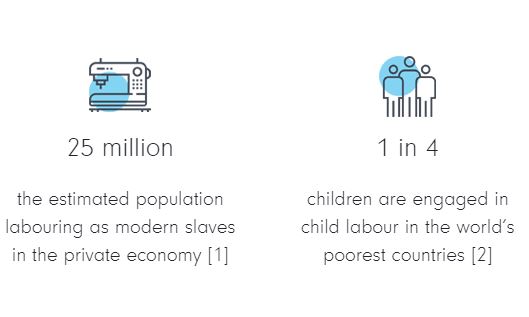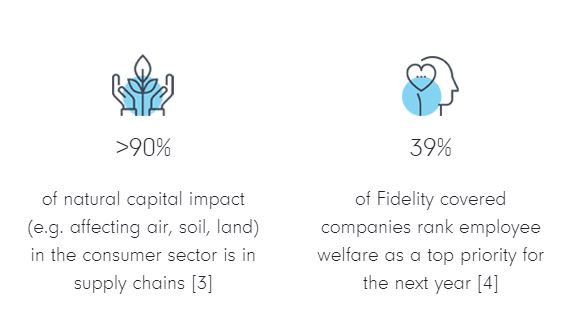Fidelity International - supply chain sustainability
The power of active engagement: We believe companies should be held to account on supply chain management - alongside other environmental, social and governance issues – and therefore continue to push our investee companies to act appropriately in order to protect and enhance long-term value.

How a company manages and monitors its supply chain forms a critical part of our analysis of any potential investment. Companies that fail to take this seriously are very likely to run into reputational, financial and legal issues that directly impacts the long-term sustainability of their business model. On the flip side, effective supply chain management can be a valuable way of securing a competitive advantage, enhancing reputation and brand, and improving operational performance.
Although some may naturally associate this issue with companies operating in emerging markets - where employment laws and practices are less advanced - it has relevance across a wide range of geographies and industries. It is a particularly critical issue for textile and apparel manufacturers and retailers - see the controversy over working conditions at UK fast fashion company Boohoo as a recent example. Due to the operational complexity and global reach of the sector’s multi-tiered supply chains, it carries a number of environmental and social risks from the sourcing of raw materials through to the manufacturing of the finished product.
Against this backdrop, we have been formally engaging with a number of companies across the globe on this important issue since 2018, with a focus on two key areas:
- 1. Human rights: wage concerns; labour exploitation and unsafe working conditions.
- 2. Responsible sourcing: encouraging green sourcing manufacturing through eco-materials and use of recycled clothes.
Our main objective is to increase the overall transparency relating to how companies manage their supply chains. This could be through board-level responsibility, enhanced disclosure and auditing, as well working with their peers and suppliers to improve practices and establish best practice.


Putting theory into practice
Engagement takes time and effort, but the progress made can be long lasting and ultimately benefit both stakeholders and shareholders. We’ve been encouraged by some of the progress we’ve made with several investee companies on this issue, ranging from sportswear and equipment to jewellery and fashion accessories.
For example, we commenced an engagement with a global baggage company back in 2018 when it had provided no disclosure on responsible sourcing or human rights within its supply chain. As a result of our engagement, we were pleased to see the company move to increase disclosure in its 2019 Sustainability Report published in 2020 and update its supplier rating system. This means that each of its tier one suppliers are now given a rating based on their business practices and workers rights, which looks at things like forced labour, child labour and other worker protections.
It is important to recognise that this is an evolving process and we are encouraging the company to focus on monitoring key environmental issues among its supplier operations. This includes things like responsible sourcing of raw materials and water and waste management. We will be following up through our regular meetings with company management to check progress and ensure our engagement activity drives positive change and leads to more sustainable practices and - in turn - investment outcomes.
Working together
In addition to individual company engagements, we are also working closely with other asset managers, policymakers and relevant bodies to drive positive change on these critical issues.
In 2020, Fidelity became a founding member of Investors Against Slavery and Trafficking Asia-Pacific (IAST APAC). This is a coalition of investors including First Sentier Investors, Aware Super, AustralianSuper, Ausbil and Schroders, among others, with collective assets under management of more than US$4tn5. IAST APAC has two work streams:
- 1. Investor statement - we sent an investor statement to the ASX100 setting out the group’s expectations of reporting companies under the Australian Modern Slavery Act. We are seeking to influence the way these companies report by setting clear expectations to go beyond the legal requirements and address labour exploitation as a leading indicator of modern day slavery.
- 2. Collaborative engagement - we are also embarking on a multi-year initiative to address complex and systematic human rights issues in the value chain through collaborative engagement with companies at risk across Asia Pacific. This will complement and strengthen our existing one-to-one engagement activity on this issue mentioned above.
Elsewhere - and closer to home - we also recently joined the “Find it, Fix it, Prevent it” initiative led by CCLA. The International Labour Organisation estimates there are 25 million people labouring as modern slaves in the private economy. The objective of this collaborative engagement is to help companies develop and implement better processes for finding, fixing, and preventing modern slavery in their supply chains.
Our first area of focus is the UK hospitality sector and as part of this initiative, we are leading the engagement with a restaurant chain regarding their suppliers’ oversight in relation to modern slavery. We have seen some early signs of progress after the company acknowledged the limitations of its existing due diligence process for suppliers. It is encouraging to hear that it is dedicating more resources to this area and we have agreed with the company to follow-up over the coming months.
Looking ahead, we must continue to hold companies to account on supply chain management - alongside other environmental, social and governance issues - as we continue to push our investee companies to act appropriately in order to protect and enhance long-term value.
Sources: 1 International Labour Organisation, 2 Unicef, 3 McKinsey, Starting at the source: Sustainability in supply chains, 4 Fidelity Analyst Survey 2021, 5 Investors Against Slavery & Trafficking | IAST-APAC (fastinitiative.org)
Important Information:
The value of the fund's assets will go down as well as up. This will cause the value of your investment to fall as well as rise and you may get back less than you originally invested.
_______________________________________________________________________
For more information about Fidelity International visit www.fidelityinternational.com/